
Monday, the Fourth of July, .1825, was one of the most impor-tant days in the his-tory of the region. On that day, near the state line, the ceremonial ground was broken for the canal that eventually went from New Haven to Northampton, commonly known as the Farmington Canal.
Today, it’s hard to imag-ine just how difficult trans-portation was at that time. Roads were reprehen-sible. If they froze hard in late fall, they could be ankle-breaking rut-ted paths. In winter, an icy-coated snowy road was treacherous for both horses and passengers in a sleigh. Spring meant sections of roads would be over a foot deep in mud. Even on warm, summer day, roads could be throat-choking dusty. Then there were the economic realities of transporting freight. In 1822, one gentleman from Worcester said that it cost less to ship goods from England to Bos-ton than from Boston to Worcester.
“Canal Fever” was endemic in the 1820’s. Many people thought that it was the magic wand for curing the country’s transportation woes. “Just build a canal, and we can ship our farm goods to the city cheaply.” For example, the Erie Canal was begun in 1817, and all 363 miles completed by 1825. Mid-western farm goods were now shipped all the way to New York City via the canal and Hudson River. In the opposite direction, many people from the Northeast began their migration west on that same artificial waterway.
The ground breaking ceremony initially started in Granby, Connecticut at their Congre-gational Church at 9 o’clock with prayer led by Rev. Mr. McLean, followed by the Honorable Timothy Pitkin of Connecticut (U.S. Represen-tative, 1805-1819), who read the Declaration of Independence. Burrage Beach, Esquire then of-fered an oration.
A parade procession was then formed. It was led by the Simsbury Artillery, then the Marshal of the day, followed by a canal boat that was mounted on wagon wheels and drawn by six horses, and described as:
“ ... fitted up in elegant style for the oc-casion. On her stern was to be seen “Farm-ington Canal,” and on each of her sides, “For Southwick and Memphremagog”--She was decorated with the flag of the United States, and with one bearing the motto “Internal Improvements,” on one side, and on the reverse, “Huzza for Clinton. “
“Memphremagog” was and is a lake on the Vermont/Canada border, and was an allusion to the possibility of continuing the canal north into Canada and connecting with the St. Law-rence River. “Huzza” was identical in meaning to our “Hurrah!,” while Clinton refers to New York Gov. De Witt Clinton, a New York politi-cian who promoted the construction of the Erie Canal.
In the canal boat sat Connecticut Gov. Wol-cott; the president of the canal company; Bur-rage Beach, Esq.; Hon. Jonathan H. Lyman of Northampton; commissioners; the canal en-gineer; and several local clergy. Behind them were the directors and stockholders of the canal company. Taking up the rear were the citizens of Connecticut and Massachusetts, which num-bered between 2,000 and 3,500, many in carriag-es, wagons and on horseback. The parade was estimated at two miles in length.
Once they arrived at the state line for the ac-tual ground breaking ceremony, Gov. Wolcott offered a relatively short address. He then broke ground, with the assistance of the canal com-pany president, by excavating a small hole. It has been said that his spade broke in half dur-ing the event. Few of the newspaper accounts report this, but the repetition of the story early on suggests its validity. Some at the time, and even more a few years later, swore that it was an allusion to the eventual financial collapse of the canal.
Northampton’s Jonathan H. Lyman followed the ground breaking by providing the keynote address for the day. His speech was well re-ceived, but not transcribed like Gov. Wolcott’s. Undoubtedly he promoted the project of con-tinuing the construction to Northampton, if not the St. Lawrence.
A portion of a newspaper clipping of 1870, quoted in Maud Davis’s “Historical Facts and Stories About Southwick,” p. 229, reads:
There was the usual band of music with the side shows, gingerbread, soda water and perhaps some other kinds of water ... the well on the old Griffin farm was drawn dry ... [boys] earned a quar-ter by bringing a pail of water from the spring which flows out of the west side of old Manitook [Mountain].
Bids for the Granby, Connecticut portion of the canal were opened on August 5, 1825, awarded, and construction began shortly thereafter. Construction north from the state line began in late 1826. The canal was ulti-mately completed to Northampton by late July 1835.
While it fueled both the imagination and the hopes of many people, especially the investors, weather and sabotage, muskrats and washouts, made it a fiscally shaky venture, and by 1848 it was out of business. The age of the railroad was at hand. In a few years, the iron horse was run-ning on the canal towpath or parallel with it.
By Clifton (Jerry) Noble, Sr.
When a road or street is surveyed for recon-struction the first of three operations is to put roofing nails, punched through bits of folded red cloth (to make them easily findable) every 50 feet along the center pavement. These become baseline “stations” from which further measurements can be made. The next operation is to take elevations at edges of pavement and at every major change in ground slope. These cross sec-tions extend at least 50 feet left and right of sta-tion nails to show designers how best to fit new construction. Elevations are also needed on all pipes, manhole and catch basin rims and edges of sidewalks. The last operation is “detail” which measures for mapping purposes everything of value such as trees, fences and even buildings, if they are close enough to the traveled way to be involved. All measurements are made in tenths and hundreds of feet rather than feet and inches according to engineering practice.
June 1, Thursday. Assistant supervisor Al Cloutier came out to Plumtree Road, Spring-field, twice, first to get our weekly time sheets and then to see if I had the preliminary plans for extension of Route 57 in Agawam where we will be working. On the way home I stopped at The Sarah Gillett Home for Aged People on Broad Street in Westfield to leave mail for my moth-er. She had a letter from Evelyn Becket, related through the Allyn family, who used visit from her job at Russell’s Westfield River Paper Com-pany before we moved from the schoolhouse to new “Pink House” on the corner of Carrington and Herrick Roads.
June 2, Friday. Lunch hours and when it rains I have been teaching the three guys in my sur-vey party, Al Kacavich, Tom Cooney and John Manzi, everything I can think of about math and engineering in preparation for the Civil Ser-vice exam at High School of Commerce on State Street in Springfield tomorrow.
Jerry Jr., born 9 a.m. April 21, 1961, now weighs 8 pounds 15 ounces. I held him till 10 p.m. Then wife Elizabeth got him quiet by mid-night after I had gone to sleep.
June 3, Saturday. I can’t eat chops, roasts, steaks or chicken without my stomach doing loops, so to get protein without meat I drink “ti-ger milk” which is made with brewers yeast ac-cording to recipe in Adelle Davis’ book Let’s Eat Right To Keep Fit. “Tiger milk” and orange juice was all I had for breakfast hoping to lose a few pounds.
We were up at 4:50 a.m. I changed and fed baby by 5:15. E washed breakfast dishes while I made beds, shook rugs and dust mopped. My long haired, black and white cat, Fluffy, cleaned up all the canned cat food I gave him and went to sleep in his box in the garage.
June 7, Wednesday. We finished 8,150 feet of Plumtree Road detail and, as expected, are once more in Agawam. Route 57 is built west from South End Bridge to Suffield Street but the ramps from overpasses and connection to Mill Street need to be completed
June 10, Saturday. Instead of going to the Glen in Russell I used three washers at the small Huntington laundry. It was crowded. A fat woman with unruly kids used my empty hamper for a waste basket. From 11 a.m. till 2 p.m. rain came down in torrents. On way home I found washouts and a boulder in Carrington Road, Mother’s brother-in-law Dave Hallock, and sons Earl and Howard with wife Carrie vis-ited in mid afternoon.
June 11, Sunday. Elizabeth, my mother and I took baby to church for baptism service. Weath-er is humid with temperature in the mid 80s. Gnats are fierce. Although I do not smoke I carry a lighted cigarette to keep them away.
June 18, Fathers Day Sunday. I did wash at Russell laundry before church. The Howlands have sold their house on Avery Road and are moving to Hanover Street, West Springfield, so this was the last Sunday I will be taking Eddy home. E got me a nice white shirt and black bow tie. In the afternoon we went to Hawthorne Av-enue, Westfield, to take gifts to Father Atwater.
June 21, Wednesday. We surveyed pit sec-tions for gravel quantities. During lunch time I got a crib blanket at Zayers. Nurse Jean Watson had a flat tire so Virginia Loomis brought her up to help E, and I took her home.
June 22, Thursday. Rehearsal for Elaine Thornton’s wedding was at church at 8 p.m. Gerry Washburn came in while I practiced mu-sic. Everyone was on time except Mr. Barr, the minister, who was late.
June 23, Friday. It was hot in the big Damato pit off Cooper Street, Agawam, so I worked in shorts.
June 24, Saturday. I had go to Westfield to wash as Glen Launderette was locked. Then I got key and opened church for Elaine’s wed-ding. Lots of Montgomery folks arrived while I played organ.
June 25, Sunday. I took mother Hester to church where she helped with my choir. She came to dinner with us and watched Jerry’s two o’clock feeding. He smiled. When I arrived home from returning Hester to Westfield Elizabeth’s folks were here visiting till 5:30 p.m.
I started wheeling baby in carriage two miles every evening for the rest of the week. My cat, Fluffy, followed us for at least a mile
Temperature ranges from 60s in mornings to mid-80s in afternoons.
June 30, Friday. I woke with sore throat and headache and couldn’t eat lunch at noon. On way home I stopped at Sarah Gillett home to see mother “Hester’ and leave $90 check for her July room and board. For supper E had Welsh rarebit and orange Jello. Good for my sore throat!
After Aunt Florence (my father’s sister) died her husband, Sam Boyce, sold their Whitman Hill summer cottage to Hollis Root. Now Hol-lis wants to sell the property for $8,900. Cousin Mildred Moore and friend Marion Shaw had leased a strip of that property for their cottage, “Little House,” so they can keep coming there from West Newton.
I met neighbor, Joe Rusin, at the Russell mar-ket. He is taking vacation time and going on the boat trip down the Connecticut River from Had-dam into Long Island Sound.


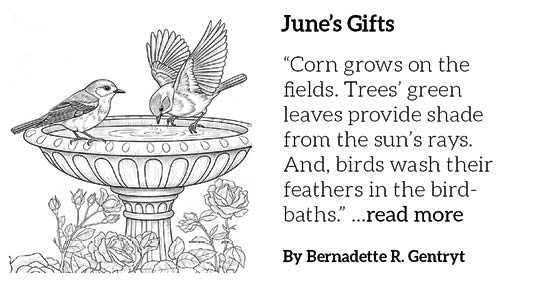
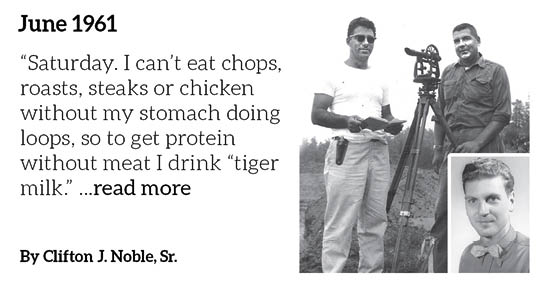
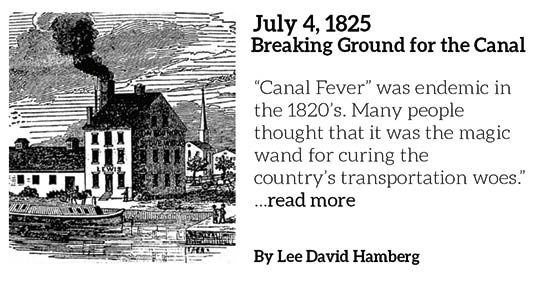

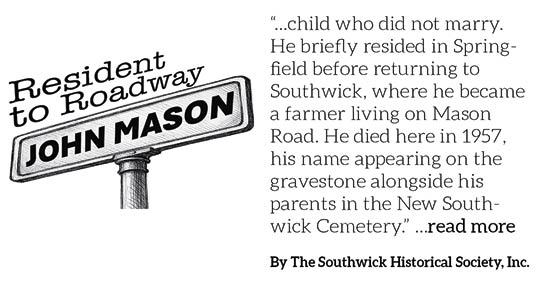

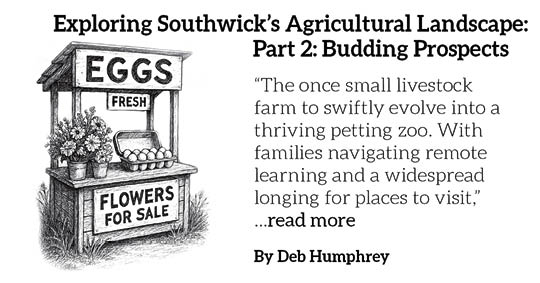




By Bernadette R. Gentry
In the park June greets us with her roses.
Their beautiful colors and sweet scents give us Hope and Peace
It is now time for brides to prepare for their wedding day
and school children and adults to make vacation plans
In the neighborhoods, blossoming flowers about in the yards.
Corn grows on the fields.
Trees’ green leaves provide shade from the sun’s rays.
And, birds wash their feathers in the birdbaths.
How Blessed we are to see
and receive all June’s gifts

June’s
Gifts











June 2014
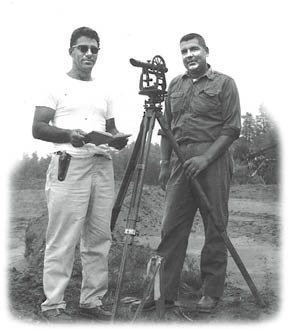
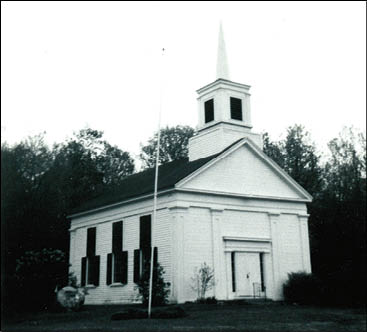
June
1961
John Manzi and Al Kacavich
Montgomery Community Church








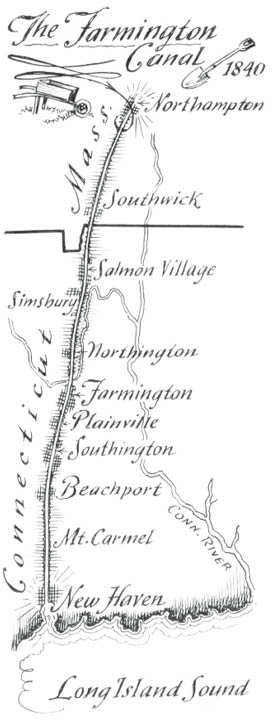
JULY 4, 1825
BREAKING GROUND FOR THE CANAL
By Lee David Hamberg
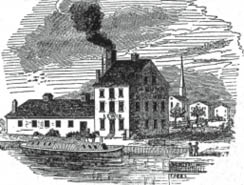
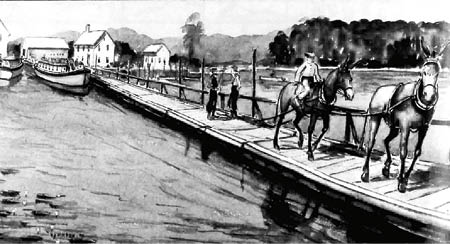
Diagram of the Canal’s dimensions and specifica-tions drawn by Eric Sloane
Above: Floating Tow Path on Middle Con-gamond Pond, 1973.
Right: Westfield South Basin, 1846.
Map of the Farmington Canal Path drawn by Eric Sloane


In my ongoing en-deavor as a member of the Southwick Agri-cultural Commission to illuminate the rich agricultural diversity of our town, I re-cently had the privi-lege of visiting two more distinct farms. Unlike the three expansive, well-established food and plant-producing enterprises I explored last month, these two are smaller operations, cultivated from the ground up in recent years.
Lindsay Hale of Firefly Fields Farm, nestled at 9 Babbs Road, greeted me with the same warmth and genuine enthusiasm for her animals that she extends to every visitor. She graciously shared the inspiring story of how she established her farm seven years ago. Lindsay acquired her home on a flat, two-acre parcel in a densely pop-ulated lakeside section of town. Quite rare given the area’s origins as seasonal cottages. It featured a house, detached garage, and small barn—a perfect foundation for Lindsay, her young son Sebastian, and her horses, previously boarded elsewhere. Thus began her remarkable farming journey.
Goats were the next delightful addition to Firefly Fields. Their milk enables Lindsay to craft an array of goat milk soaps and lotions. While initially exploring farmers’ markets for sales, she discovered that an online business proved a more efficient use of her invaluable time.
During the initial years, Lindsay balanced a full-time job with building her dream farm then the unforeseen pandemic prompted a life-alter-ing decision, she left her job to care for her son, who was learning remotely.
The once small livestock farm to swiftly evolve into a thriving petting zoo. With families navigating remote learning and a widespread longing for places to visit, Firefly Fields Farm offered a perfect response. Booking private vis-its, families could immerse themselves in the farm experience, and Lindsay’s schedule quickly filled. The petting zoo boasts a charming array of animals, including horses, ponies, goats, pigs, ducks, chickens, and rabbits.
Lindsay breeds some of these animals, en-suring a continuous variety of baby animals for visitors to interact with. Many of the farm-born animals are sold as pets, effectively managing animal numbers while providing an additional revenue stream.
Firefly Fields Farm extends its warm welcome to both on-site visitors and takes its delightful troupe on the road for birthday parties and other petting zoo events. Lindsay also hosts goat yoga classes.
Beyond her exquisite goat milk soaps and lo-tions, she operates a quaint farm stand on her property, offering fresh duck and chicken eggs.
My next stop, Shawna Sperry’s Second Eden Farm, shares a similarly earnest beginning. Al-most a decade ago, Shawna acquired her own slice of heaven: a house at 67 Hillside Road ac-companied by 5 ½ acres of wooded land. Her de-sire, too, was to create a home for herself and her horses.
Second Eden Farm is not Shawna’s primary source of income but her farming endeavors flourish in her off-hours. She shares her farming life with her housemate, Mike. The realization of her dream neces-sitated the arduous process of clearing land on a budget. This physically de-manding project has progressed steadily, with approximately two acres now cleared for her agricultural pursuits.
At her roadside stand, Shawna offers farm-fresh eggs, a variety of homegrown fruits and vegetables, and beautiful cut flowers. Last Au-gust, during Open Farm Day, I had the pleasure of seeing the turkeys she was raising for Thanks-giving sales. Shawna’s long-term goal is to con-tinue her full-time profession while striving for Second Eden Farm to become self-sufficient through its sales.
If you are interested in supporting and safe-guard Southwick’s cherished rural farm charm and scenic vistas, both our established and na-scent farms, I encourage you to visit the South-wick Agricultural Commission website to find a diligently maintain list of farms and their con-tact information. New farms can reach out via the website or contact any of the commissioners listed there to be added to the list.
Many of Southwick’s roads feature both the first and last names of a past resident who lived on that road. John Mason Road, formerly a dead end off Klaus Anderson Road, is one such example. Born in Southwick in 1845 to Ebenezer King and Louisa (Giddings) Mason, John lived his entire life in this town, passing away in 1923. In 1876, John married Emma Tryon, daugh-ter of Benjamin R. and Mary (Clapp) Tryon of Granville, in Milford, Connecticut. Together, they had at least six children—four sons and two daughters—within an eighteen-year span, from 1879 to 1897. (An interesting familial note: John’s brother, Abbott Mason, married Emma’s sister, Lelia Tryon, in Granville in 1869.)
Jennie Louisa Mason, born in 1879, married Matthew MacIntyre, a native of Scotland, in Hartford, Connecticut, in 1902. Their three chil-dren were all born in Springfield. By 1940, Jen-nie and Matthew had divorced, and Matthew had subsequently married Caroline Nicholson. Jennie passed away on Christmas Day 1948 and was interred in the New Southwick Cemetery. Matthew and Caroline were laid to rest together in Canandaigua, New York, having died in 1960 and 1966, respectively.
Lowell Garfield Mason, born in 1881, married Ella May Ripley, daughter of Silas and Catie (Clark) Ripley of Granville, in 1906. Their three children, Merrill, John, and Jeannette, were all born in Southwick and, like their parents, con-tinued to reside here throughout their lives. Lowell died in 1960, and Ella passed away in 1980.
Luther Abbott Mason, born in 1884, was the only child who did not marry. He briefly resid-ed in Springfield before returning to Southwick, where he became a farmer living on Mason Road. He died here in 1957, his name appearing on the gravestone alongside his parents in the New Southwick Cemetery.
Raymond Ashley Mason, born in 1886, attend-ed the Root District School in 1898—a building that, now a private residence, still stands today. In 1910, he was living in Alaska Territory. By 1919, he had returned to Southwick and mar-ried Bessie Ams-den in Albany, New York. Bessie was the daugh-ter of Hollis and Hattie (Putnam) Amsden, resi-dents of Spring-field. Raymond died in Southwick in 1924, and his widow, Bessie, passed away in Westfield in 1940. Their names are inscribed on a gravestone with his sister Jennie (Mason) Ma-cIntyre, his sister Blanche, and Blanche’s hus-band, James W. Cronon, in the New Southwick Cemetery.
Harold Tryon Mason, born in 1894, married Dagma Fant in 1921; she was born in Finland in 1897. In 1930, they were residing in Wytheville, Virginia, where he worked as a nursery manag-er. Their elder son, Paul, was born in Southwick, while their younger son, Philip, was born in Wytheville. The family returned to Southwick by 1935 and lived there until Harold’s death in 1962. In 1970, Dagma remarried, this time to James Walden Cronon, the widower of Harold’s sister Blanche.
Blanche Hazel Mason, born in 1897, married New York native James W. Cronon in 1920 in Albany. They resided in Springfield in 1930; by 1940, they were residents of Norwich, Connecti-cut. Blanche died there in 1969. James passed away in Windsor, Connecticut, in 1979 and was interred with Blanche in the New Southwick Cemetery.
Remarkably, all six of the Mason children, along with several of their spouses, are buried in the New Southwick Cemetery, the same rest-ing place as their parents, John and Emma.

Across human history, expression through the creative arts has been synonymous with our very existence. From ancient cave drawings to Renais-sance-era paintings to contemporary pieces, art has been and always will be at the forefront of what it means to be human. Moreover, the term “art” and its cultural importance extend beyond just paintings. Singing, dancing, acting, writing, theatre, television, movies, video games and so much more are all forms of art. Art is a catalyst for creativity and personal expression, reflecting diverse human experiences, societal values, and the emotions of our fellow human beings, thus becoming the key to connecting people around the world. Therefore, the artist and how they shape culture act as glue binding our world to-gether into one unified populace.
Despite their importance, the arts are often unappreciated. The skill of creativity paramount to art is undervalued in comparison to other skills such as mathematical and scientific proficiency. Moreover, the pursuit of creative arts is associ-ated with numerous future struggles, driving society to favor more popular and financially re-warding avenues. But ask yourself−can we truly justify the existence of something solely through the lens of monetary value without detracting from its purpose and importance? I argue that not everything is quantitatively measurable. Rather, the arts are a qualitative field; their societal pur-pose lies beyond its face value.
As mentioned, the importance of art lies within its impact on individuals and the purpose and meaning found within that shapes our society and culture in a myriad of forms. One such ex-ample is the connection between art and emotion. Think of some of your own experiences; whether it’s a child’s painting, watching a performance, or reading a book, one can experience a wide range of emotions through art. People gain a better understanding of their own emotions and the emotions of others via art, building under-standing and empathy. As we connect with art that reflects our personal experiences and values, we recognize ourselves within, inciting deeper personal reflection as we admire its beauty and meaning.
The process of creating art has physical and psychological benefits as well. Multiple stud-ies show a correlation between artistic activity and reduced anxiety and stress, increased self-confidence, a positive self-image, and improved problem-solving skills. Creative activities have also been linked to several improvements to physical well-being, such as reduced chronic pain, a boosted immune system, and improved motor coordination, among other things.
Art also serves as the backbone of storytell-ing and a key method by which messages are conveyed. Regardless of its form, art can add a nuance and depth to a story and its characters that mundane words cannot provide. Vivid details make these stories feel alive and add layers of symbolism that resonate with viewers. Moreover, artists convey cultures, emotions, and beliefs through many forms such as dances de-noting a heritage or group identity, or sculptures of important leaders and gods displayed in muse-ums. Audiences become emotionally captivated in ways that only artistic expression is capable of. In short, art allows a message to stand out in a vast sea, shap-ing society and opening minds to new perspec-tives which inspire people to tell their own stories.
Art also enriches education. Students who engage in the arts develop creative thinking skills as well as their ability to communicate feelings and ideas. Visual representations strengthen skills such as information analysis, forming arguments, and making connections, especially among children. Furthermore, art in the classroom can be useful in introducing new and complex top-ics clearly and effectively. It allows students to practice critical thinking skills through the identification of patterns and the exploration of how different nuanced elements interact to cre-ate a bigger picture. Thus, creative expression incites deeper thinking. When used as part of educational curricula, it makes learning more engaging, meaningful, and effective. The skills cultivated by artistic expression are pertinent to all aspects of life as well, making engaging in art that much more useful for personal growth and career success.
Finally, let us consider where each of these aspects of the importance of art intersect: the creation of social change. In generations past, art has been a means of challenging the status quo of society, correcting injustices, and standing against oppression. Through creative expression, one can bring attention to and educate people regarding systemic issues, advocate for perspec-tives that have been silenced, and create positive cultural shifts, all while inspiring others to do the same. Think back in history to when empires clashed and when cities were taken. What lay in the wake of this destruction was heartbreaking; writings burned, statues toppled, and thriving cultures erased in the name of suppression, control, and quashing rebellion. Yet thousands of years later, the conquered speak through the artistic works that many sacrificed their lives to keep safe.
Today, whether it’s a poster held at a protest, literature about overcoming adversity in the form of injustice and oppression, or a song criti-cizing the cultural norms of society, art is how we challenge oppression through exposure and create real change for the better. With artistic ex-pression, the artist and their audience may find resilience and strength in the face of adversity; from there, a more just world is that much closer to fruition.
Returning to where we started, all of this is not to say that providing a living for oneself is not important, but to remind that the value of the arts in our society goes far beyond a price tag. As a writer and actor, I find a sense of fulfillment in writing and performing that brings me immense joy. The things I have learned through artistic expression−the ways in which I have come to understand myself and the world around me−are simply irreplaceable, and that is why the creative arts are so important to humanity. Creating and engaging with art allows us to make sense of the immense and often confusing reality we live in and express the emotions, beliefs, histories, and cultures that define our existence. Art brings us purpose, and with purpose comes understand-ing of ourselves, of each other, and of the very world around us. It therefore deserves our ut-most respect and admiration for the nuanced understanding it provides.
It is important to note, too, that you do not have to make a career out of art to be an artist. All creative expression is art; whether you’re a vet-eran movie star or are trying out painting for the first time, what matters is that you are engaging with the craft and are willing to learn something new. No matter who you are or how experienced you may be, the arts can enrich your life in more ways than one So I invite you to find an art form that you find interesting and try your hand at it. Put paint to canvas, write a poem, sing a song, whatever piques your interest. Simply give it a chance, and you’ll quickly see for yourself why the arts have been and always will be the key to a more beautiful view of the world and life itself.





Why Creative
Arts Matter
by Lucas Caron























By
The Southwick
Historical Society,Inc.
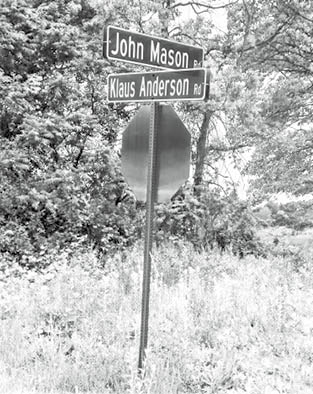
Summer is often celebrated as a sea-son of sunshine and freedom—yet for many families, it can quietly become a time of overstimulation, exhaustion, and emotion-al dysregulation. In a culture that continually pushes for more camps, more outings, more screen time, more of everything… what if we chose less?
What if this summer offered a soft place to land, a genuine chance for children to exhale, reflect, and truly rediscover themselves? What if “slow” became our superpower?
Why Slow Matters for Kids’ Mental Health
Children don’t just need a break from school; they profoundly need a break from pressure. When we intentionally embrace slowness, we provide:
• Time to regulate: Quiet, unhurried days al-low the nervous system to settle, which is espe-cially crucial for sensitive or anxious children.
• Space for creativity: Unstructured time is an open invitation for imaginative play, authen-tic problem-solving, and pure wonder.
• Opportunities for connection: When sched-ules aren’t relentlessly packed, there’s ample room for spontaneous shared moments and genuine joy.
• Rushing can often masquerade as accom-plishment, but it frequently crowds out the very elements that are fundamental to building con-fidence: emotional safety, present-moment at-tention, and intrinsic motivation.
Summer Rhythms That Heal
Here are a few playful, purposeful routines that can gently anchor children during the sum-mer months:
1. “Slow Start” Mornings: Instead of immedi-ately diving into screens or scheduled outings, begin the day with a soft ritual: perhaps reading aloud, a peaceful nature walk, quiet journaling, or calming coloring. Gentle music or breakfast enjoyed outdoors can establish a sensory foun-dation for calm. Parent Tip: Create a “morning menu” from which kids can choose activities that gently energize them, such as stretching, doodling, or watering plants.
2. Sensory-Focused Adventures: Dedicate time each day to one simple sensory activ-ity. This could involve refreshing water play, grounding barefoot walks, expressive chalk art, or tranquil cloud-watching. These moments naturally engage the body and soothe the brain.
Emotional Benefit: Sensory input from ele-ments like water, sand, and movement empow-ers children to self-regulate without the need for verbal explanations.
3. Mini “Do-Nothing” Days
Purposefully build days with absolutely no plans. Allow children the space to follow their boredom into unexpected creativity. You might be genuinely surprised at what remarkable things emerge when nothing is scheduled.
Conversation Prompt: Try asking, “What could we invent today with what we already have?”
Connection Over Control: Gentle Summer Boundaries
The aim isn’t zero structure, but rather the cultivation of the right kind of rhythm. Chil-dren still benefit from predictability, just with significantly more breathing room. Consider implementing:
Visual schedules featuring flexible time blocks (e.g., “Outside time,” “Quiet play,” “To-gether time”).
“Yes spaces” where children are free to lead play without rigid cleanup rules or immediate adult correction.
Parent-child check-ins at the start and end of the day to reflect on experiences and reset ex-pectations.
Slow is Brave
In a world that continually praises swift re-sults and overflowing calendars, the act of slow-ing down is, in itself, an act of courage. And fundamentally, children learn from what we model. When we demonstrate that joy doesn’t always have to be loud, that rest is inherently valuable, and that profound connection often blossoms in the quiet moments—children truly listen.
So this summer, let us choose slow. Let us deliberately make room for curiosity, for day-dreams, for soft blankets, for backyard bugs, and for laughter with no imposed time limit. Slowing down doesn’t equate to missing out; rather, it helps children feel more authentically like themselves.
A Psychologist’s Guide
Inside the Young Mind:
Slow is a Superpower
By Dr. Simone Phillips



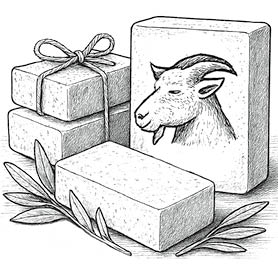
Exploring Southwick’s Agricultural Landscape Part 2: Budding Prospects
By Deb Humphries
When a son, heading off to college, asked his dad for the best advice he’d ever received, the dad, unable to condense a lifetime of wisdom, simply shrugged and said, “Just do you.”
I get it “just be yourself,” but how well do we truly know ourselves at 18, 28, or even 80?
Only God knows the true you. He designed you, drew your blueprints, and created you. He wants you to see yourself as He sees you: beauti-ful, blessed, loved, valued, special, a masterpiece, one of a kind, irreplaceable, uniquely gifted. He promises all things are working together for your good, and your future is getting brighter and brighter. God has known you since before you were born; He knows who He created you to be and what He’s calling out of you.
Lesson 1: Don’t argue for your limitations.
Motivational speaker Les Brown said, “When we argue for our limitations, we get to keep them.” How often are we more loyal to our limita-tions than our potential, acting as defense attor-neys for what holds us back? We talk ourselves out of great ideas, fearing failure or ridicule, even when God is trying to move us forward. We be-come so effective at arguing for our limitations that we end up keeping them.
Maybe you’ve got a great business idea, but you won’t even take the first step to see if it’s vi-able, because you’ve talked yourself out of it. I’ll probably fail. This is a stupid idea. People are just going to laugh. You’re so scared that you won’t be able to do it that you write yourself off before you even try.
When the devil tells you that you’re worth-less, do you start collecting evidence to prove him right? Do you say, “That’s right, I am worthless,” and then list all the evidence from your past that backs up that accusation.
I think we need to add another sentence to that motivational phrase of Les Brown... When you argue for your limitations, you get to keep them. But if you agree with God about your po-tential, you get to grow into it.
Remember when Moses sent spies to scope out the Promised Land? They came back say-ing, “We seemed like grasshoppers in our own eyes, and we looked the same to them.”And so they lived a grasshopper existence in the wil-derness for the next 40 years! A generation later, Joshua found himself at the exact same spot, on the edge of the Promised Land. When Joshua sent more spies to check out the land, they came back with a totally different report – an optimis-tic report. “The Lord has surely given the whole land into our hands; all the people are melting in fear because of us.”
They saw the same land, enemies, and risks, but their mentality was different. They agreed with God about their potential, setting them-selves up for growth, success, and victory.
What about you? Don’t argue for your limita-tions, or you’ll keep them. Agree with God about your potential, and you’ll grow into it.
Lesson 2: Defy your default.
There was a middle-aged man who realized his pants no longer fit because he was gaining weight. He brought his clothes to the tailor and said, “I hate this! I could use this money for a lot of other things. Instead, I’m paying to have my clothes made bigger.” However, eventually he redefined his experience with exercise, he had hated it before telling people, “I hate exercise. I hate to work out. I hate to sweat.”
That was his default—he hated working out and sweating. But then, he decided to defy his default. He started walking daily, built a home gym he called the “POUND Room” (Place of Ultimate Natural Development), and transformed his relation-ship with exer-cise. Ten years later, he loves it, feels awesome, and now calls himself a “work-out person.” The old version of him became a new, stronger version.
When did the switch happen? There wasn’t one particular work-out. But he says, “Somewhere along the way, the old version of me became a new version of me. The weaker version became a stronger version. And I like this version better.”
Maybe you’re a little bit like Joshua in the Bible … When God called Joshua to lead Israel, God knew Joshua had to see himself differently than he had up to that point. Joshua struggled with self-doubt. He had always been second-in-command and just took over from Moses, the guy who led Israel out of Egypt. Moses was leg-endary, so Joshua had “big sandals” to fill. And he was supposed to lead Israel into the Prom-ised Land, which was an impossible goal unless God did a whole lot of miracles.
God challenged Joshua and said, “No one will be able to stand against you all the days of your life. As I was with Moses, so I will be with you; I will never leave you nor forsake you. Be strong and courageous, because you will lead these people to inherit the land I swore to their ancestors to give them.”
Joshua’s default was fear and insecurity. His default was to be second-in-command. But it was time to challenge those default settings.
Let me ask you: What does God see in you that you can’t see in yourself? What default do you need to defy? Where have you been stuck so long that you’ve assumed this is who you re-ally are and who you’ll always be?
Your default is not your destiny. It’s just where you are today and how you act right now. But you are growing. You are changing. Tell yourself: “I’m not stuck unless I stop.” As long as you don’t stop, settle, or make excuses for a version of yourself beneath what God sees, your default cannot define, defeat, or deter you.
I’m not asking for perfection; I’m asking for progress. Don’t argue for your limitations, or you’ll keep them. Defy your default. Your default is not your destiny.



It’s truly enlightening to experience out-comes beyond our expectations. When some-thing that looks bad happens sometimes the outcome can surprise you. Walk confidently that all will work out. Let me share some gold-en nuggets that have glimmered my way; your memory will surely be stirred with your own positive results.
Looking at expectations from a distance, sometimes it takes a new perspective to be amazed by the natural beauty. The stars can only shine in the dark of night, the calming crash of waves is only available by the might of the sea, and the wonder of the forests requires the lumbering size of trees. I love them all and learn something new in their presence.
Speaking of the beauty of forests, their prom-inence is understandable, but living in a house surrounded by 75-foot-tall, aged white pine trees results in constant labor. They sit peaceful-ly rooted until strong winds arrived, endanger-ing a well-built shelter called home. After large pines fell, causing great damage, an urgent de-cision regarding the 16 remaining tall, mature pine trees had to be made. Immediate removal was the intelligent choice. Talking to an expert, he provided a new vision for our tree-filled property. His words, “I will be happy” with the sun-filled outcome, were well beyond what Su-sanna and I expected.
To be sure we are experiencing some “rain” in our lives but have you ever seen clearer shin-ing than that which follows a shower? The sun transforms raindrops into gems, flowers look up with fresher smiles and faces glittering from their refreshing bath, and birds from among the dripping branches sing with notes of joy. Be still, can you hear them? These comforting sounds are meant for you.
Even a simple trip to a restaurant cane bring welcome surprises. Wilcox’s Pier Restaurant in West Haven, Connecticut, prepares great sea-food. Many patrons came just to watch wait-ers, arms full of trays, walk through a door that magically opened for them. The first automat-ic door was installed there in 1931, so servers wouldn’t have to use their arms to push it open. Set a place for loved ones at the table and serve through the door of opportunity.
I think to this last Kentucky Derby as one be-yond expectation, especially for one jockey. On March 23, 2025, Junior Alvarado was riding a horse named “Term” in the 10th race at Flori-da’s Gulfstream Park when things went horri-bly wrong. As the race was running, Term suf-fered a heart attack and dropped to the track. Alvarado was dislodged, falling to the ground himself. Throb-bing pain rushed to Al-varado’s fractured right shoulder blade. This was the same gentleman slated to ride Sovereignty in the Kentucky Derby in early May. “It was heart-breaking,” Alvarado said. “But I have a lot of confi-dence. Every day, I kept asking, ‘Please heal me. Please heal me.’ I just knew, if it is meant to be, I will get back for the Derby.” Beyond expectations, the phrase “meant to be” transformed into reality.
Alvarado turned in a Derby ride and a hard-charging Sovereignty hooked and then passed the favored Journalism in the high stretch, win-ning the 151st Kentucky Derby by one-and-a-half lengths in a time of 2:02.31 before a rain-drenched crowd of 147,406 at Churchill Downs.
Trials and adversity will arrive. When they hit, do not give up; you are more of a conqueror than you think. Setting your mind on a vision lack of expectations reaps rewards. Positive at-titudes will encourage and “kick start” your body to dance on mountaintops. Enlarge your expectations today and prepare for the antici-pated prizes ahead.
Beyond
Expectations
By Michael Dubilo

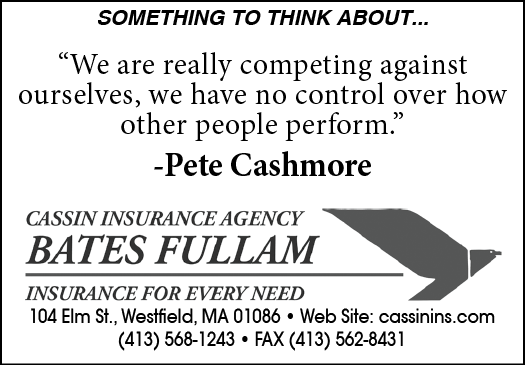













Just Do
You




To include your event, please send information by the 1st of the month. We will print as many listings as space allows. Our usual publication date is around the 10th of the month. Email to: magazine@southwoods.info.
Tolland COA
Tag Sale and Community Events
Saturday, June 23rd: Come out for a great day in Tolland sponsored by Tolland COA and supported by Tolland’s Fire and Police Department, Public Works, Health Department and Cultural Council. Saturday June 28th 9am to 2pm at the Tolland Public Safety Complex on rt 57.
Stanley Park
Sunday Night Concert Series
JUNE 29, 2025 - Studio Two is a headlining Beatles tribute band featuring Berklee College of Music alumni. We focus on the most exciting and energetic period of The Beatles — the early years (1962-1966). We perform in period-correct attire and use vintage equipment, transporting the audience back in time to the height of Beatlemania! This performance begins at 6:00 p.m. and it is free of charge. Chairs will be provided and a food service will be available. For further information on the Westfield Bank Sunday Night Concert Series please go to www.stanleypark.org or call the park office at 413-568-9312.
Salmon Brook Historical Society
Summer Season
Starting June 22nd: Summer tour season is beginning! The Salmon Brook Historical Society will have its main campus open for tours of our historic homes, one-room schoolhouse, and tobacco barn starting June 22nd. The tours occur Sunday afternoons from 2-4 p.m. and will continue through the end of September (excluding the holiday weekends of July 6 and August 31). In addition, on Sunday, June 29th, our collection of Aaron Draper Shattuck paintings will be available to view in our library. Location: 280 Salmon Brook Street, Granby, CT. On Saturday, June 28th from 10 a.m.-noon, we will be offering tours of our historic Wilcox House. Enjoy a tour of the first and second floors of the home, built in 1800 by Sadoce Wilcox, and watch a weaving demonstration on the antique loom. Location: 143 Simsbury Road, West Granby, CT. Donations are gratefully accepted and allow us to maintain the homes and host these demonstrations.
Southwick High Class of ‘75 Reunion
Saturday, July 19th: Southwick High School’s class of ‘75 is holding their 50th class reunion on Saturday July 19th from noon to 6pm. at the Lake George Sports on North Loomis Street in Southwick. Further details will be posted on the reunion’s Facebook page: Southwick Class of ‘75. If you are on Facebook join that page by clicking “Follow”. If you are not on social media but want to attend email SHSfifieth@gmail.com and information will be emailed to you as it becomes available.
Stanley Park
Accessible Bird Walk
June 15th: This bird walk is designed for people who love to watch birds but need an accessible path to walk on, or roll their wheelchairs. We will use accessible trails through the gardens to look for birds. Bring binoculars if you have some. Martha (Marti) Kane grew up in Westfield but spent most of her career in North Carolina training park rangers and managing a nature preserve. She recently retired and moved back to the area. She enjoys doing eBird counts at area parks and monitoring nest boxes for bluebirds and other cavity-nesting songbirds. The workshop will meet at the restrooms near the Woodland Wildflower Garden (park in big parking area near the Carillon Tower). Nature workshops are free of charge.
Southwick Civic Fund
Southwick Fireworks Fundraiser
June 1st: Southwick, MA — After a pause last year due to limited fundraising time, the Southwick Civic Fund is making one more bold attempt to bring the fireworks back—and we need your help! Mark your calendars: Saturday, August 9th at The WICk 338 Motocross Track Fireworks will light up the sky at dusk. This year’s event will feature music from a local DJ, a few great food trucks, and free kids’ rides—if we can raise enough funds in time. Parking will be available at Wally Park. and Rec Center baseball parking lot. This is a true community effort, and every donation counts. If you’ve ever enjoyed a summer evening filled with laughter, music, and fireworks—or if you want to create those memories for your neighbors and their kids—please consider giving to this worthy cause. Thank you, Southwick, for always showing up with heart and hometown pride. Let’s light up the sky together. https://www.gofundme.com/f/bring-back-fireworks-to-southwick
Southwick Lions Club
Concession Stand
June 28th: The Southwick Lions Club will have a concession stand on Saturday, June 28th outside the entry gates during the National Motocross Championship at The Wick 338, Legion Road, Southwick. Stop by to say hello and grab some food (breakfast sandwiches, hot dogs, cheeseburgers, meatball grinders, chips, soda and water) from 7 am until the start of the opening ceremonies.
Jam Session
Join us for Jam Sessions every Thursday from 6pm-9pm in the Southwick Meeting House located at 222 College Highway (formerly Christ Methodist Church). For more info please call Bob Fox at 413-579-4585. Open to all and any age. All fun and no pressure. Explore your talent or come to listen to some good music.



10-5
COUNTRY PEDDLER
CLASSIFIEDS
GOODS & SERVICES
DELREO HOME IMPROVEMENT for all your exterior home improvement needs, ROOFING, SIDING, WINDOWS, DOORS, DECKS & GUTTERS extensive references, fully licensed & insured in MA & CT. Call Gary Delcamp 413-569-3733
RECORDS WANTED BY COLLECTOR - Rock & Roll, Country, Jazz of the 50’s and 60’s All speeds. Sorry - no classical, showtunes, polkas or pop. Fair prices paid. No quantity too small or too large. Gerry 860-402-6834 or G.Crane@cox.net
GOODS & SERVICES

Lakeside Property management - For all your landscaping needs. Mowing, new lawn installs, sod, mulch/stone installation, bush trimming, retaining walls, snow plowing/removal, etc. Serving Southwick, Suffield, Granby, Agawam, Westfield, Simsbury. Residential and commercial. Call Joe 413-885-8376. Give us a call and let us get that property looking the way you want it! Now accepting major credit cards.
St. Jude’s Novena - May the sacred heart of Jesus be adored, glorified, loved and preserved throughout the world now, and forever. Sacred Heart of Jesus pray for us. St. Jude, Worker of Miracles pray for us. St. Jude, Helper of the Hopeless, pray for us. Say this prayer 9 times a day. By the 8th day your prayer will be answered. It has never been known to fail. Publication must be promised. Thank you St. Jude. ..- GR

St. Jude’s Novena - May the sacred heart of Jesus be adored, glorified, loved and preserved throughout the world now, and forever. Sacred Heart of Jesus pray for us. St. Jude, Worker of Miracles pray for us. St. Jude, Helper of the Hopeless, pray for us. Say this prayer 9 times a day. By the 8th day your prayer will be answered. It has never been known to fail. Publication must be promised. Thank you St. Jude. ..- DG










